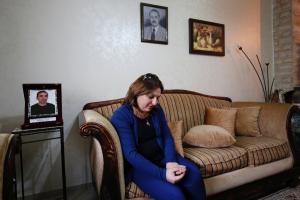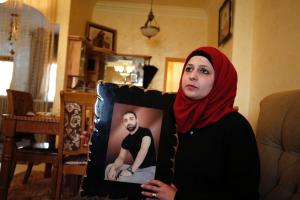Ramallah (Palestinian Territories) (AFP) - When he was sentenced to life by Israel a decade ago in a murder case, Ahed Abu Golmi offered to divorce his wife so she could live freely, but she refused.
"I love Ahed and we are still connected," said Wafa, who has taken care of their son and daughter alone since her husband went to jail.
More than 7,000 Palestinians are currently held in Israeli prisons, with around 600 serving life sentences, including Golmi, according to the Palestinian Prisoners' Club rights group.
The prisoners are often glorified in Palestinian society as heroes of the "resistance", but their wives are less noticed, often left to care for families alone.
Women who indeed choose to divorce often do so quietly, with the subject seen as taboo.
Khalida Muslih, 39, said she had no second thoughts in deciding what course to take when her husband Mohammed was given nine life sentences for deadly attacks against Israelis.
View gallery

Wafa Abu Golmi pictured at her home in the West Bank city of Ramallah (AFP Photo/Abbas Momani)
According to her, being the wife of a prisoner serving time for attacking Israelis is something to be proud of, and she will never change her mind.
When her husband was sentenced in 2002, only a year and a half after they were married, she ululated in joy.
"All these years I have never regretted a thing," said Muslih, whose son was just four months old when his father was jailed.
"I was proud to be the wife of a fighter, even if that meant depriving myself of many things and breaking my heart."
- Hopes of prisoner swap -
View gallery

Khalida Muslih, the wife of Palestinian prisoner Mohammed Muslih, shows a portrait of her jailed hus …
At one point, she went 12 years without being able to speak to him, but after a long legal battle, she was given the right to visit her husband.
Now she can speak to him by telephone -- with a panel of bulletproof glass between them.
Muslih says she maintains the "indestructible hope" that they will one day be reunited through a prisoner exchange.
She prides herself on taking care of the family home that she and relatives of her husband rebuilt after it was destroyed by the Israelis in retaliation for her husband's attacks.
She now works in a telecommunications company and takes care of her son.
"Whenever I look at him, I tell myself that he lacks a father at his side," she said.
As a result, "I am a mother, father, brother and sister to my son."
It was for that very same reason that Abu Golmi, who was sentenced to life for taking part in the murder of Israeli tourism minister Rehavam Zeevi in 2001, suggested to his wife that they divorce.
Wafa rejected the offer, but says she knows "many women who divorced when their husbands were given life sentences".
"Some did it because their husbands demanded it, others asked for it themselves," she said.
Some Palestinian wives have come up with extreme ways of enlarging their families while their husbands are behind bars.
Semen has been secretly smuggled out of prison in unclear circumstances to allow women to have more children, according to the Palestinian Prisoners' Club.
It says that 35 babies have been born that way after more than 60 such clandestine transfers.